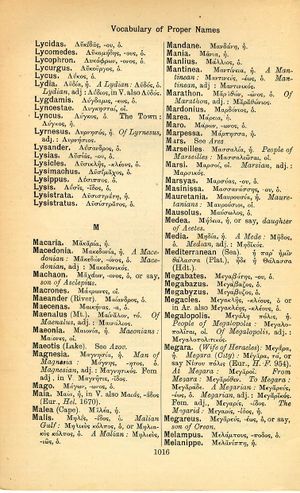Maeander: Difference between revisions
(Names) |
(6_9) |
||
| Line 1: | Line 1: | ||
{{WoodhouseENELnames | {{WoodhouseENELnames | ||
|Text=[[File:woodhouse_1016.jpg|thumb|link={{filepath:woodhouse_1016.jpg}}]](River) [[Μαίανδρος]], ὁ. | |Text=[[File:woodhouse_1016.jpg|thumb|link={{filepath:woodhouse_1016.jpg}}]](River) [[Μαίανδρος]], ὁ. | ||
}} | |||
{{Lewis | |||
|lshtext=<b>Maeander</b>: (Maeandros or Mae-andrus), dri, m., = Μαιανδρος,<br /><b>I</b> a [[river]], [[proverbial]] for its [[winding]] [[course]], [[which]] rises in Great [[Phrygia]], flows [[between]] [[Lydia]] and [[Caria]], and falls, [[near]] [[Miletus]], [[into]] the Icarian Sea, [[now]] Mendere Su; nom. [[Maeander]], Liv. 38, 13, 7; Sen. Ep. 104, 15; Plin. 2, 85, 87, § 201; 5, 29, 31, § 113; Claud. Eutr. 2, 266; Avien. Perieg. 999: Maeandros, Ov. M. 2, 246; 8, 162; id. H. 9, 55: Maeandrus, Sil. 7, 139; Paul. ex Fest. p. 136 Müll.; acc. Maeandrum, Liv. 38, 12; 13: Maeandron, Luc. 3, 208: [[more]] Maeandri, i. e. [[with]] turnings and windings, Col. 8, 17, 11.—<br /> <b>2</b> Personified, acc. to the [[fable]], the [[father]] of [[Cyane]], and [[grandfather]] of [[Caunus]] and [[Byblis]], Ov. M. 9, 450.—<br /> <b>B</b> Transf. (from the windings of the Mæander), as an appellative, and [[hence]] also in the <[[number]] opt="n">plur.</[[number]]><br /> <b>1</b> A [[crooked]] or [[roundabout]] [[way]], a [[turning]], twisting, [[winding]], meandering, [[maze]], etc.: quos tu Maeandros, quae deverticula flexionesque quaesisti? Cic. Pis. 22, 53; Amm. 30, 1, 12; cf. Ov. M. 2, 246; 8, 162 sqq.; Sil. 7, 139; Sen. Herc. Fur. 683: in illis dialecticae gyris [[atque]] Maeandris, Gell. 16, 8, 17: Maeandros faciebat et gyros, etc., Amm. 30, 1: Mĕandros, Prud. Cath. 6, 142.—<br /> <b>2</b> In [[embroidery]], a [[border]] [[wrought]] [[with]] [[many]] involutions or windings: victori chlamydem auratam, [[quam]] plurima [[circum]] Purpura Maeandro duplici [[Meliboea]] cucurrit, Verg. A. 5, 251; cf. Serv. in loc.; cf. Non. 140, 2, and Paul. ex Fest. p. 136 Müll.— Hence,<br /><b>II</b><br /> <b>A</b> Maeandrĭus, a, um, adj., = Μαιάνδριος.<br /> <b>1</b> Of or belonging to Mæander, Mæandrian: juvenis Maeandrius, i. e. [[Caunus]], the [[grandson]] of Mæander, Ov. M. 9, 573.—<br /> <b>2</b> Of or belonging to the [[river]] Mæander, Mæandrian: [[unda]], Prop. 3, 32, 35: flumina, Claud. VI. Cons. Honor. 635.—<br /> <b>B</b> Maeandrĭcus, a, um, adj., Mæandrian (acc. to I. B. 2.): [[fluxus]], Tert. Pall. 4 med.—*<br /> <b>C</b> Maeandrātus, a, um, adj., [[full]] of curves [[like]] the Mæander, Mæandrian: [[facies]] Maeandrata et vermiculata, Varr. ap. Non. 140, 5 (Sat. Men. 86, 14). | |||
}} | }} | ||
Revision as of 08:36, 13 August 2017
English > Greek (Woodhouse)
(River) Μαίανδρος, ὁ.
Latin > English (Lewis & Short)
Maeander: (Maeandros or Mae-andrus), dri, m., = Μαιανδρος,
I a river, proverbial for its winding course, which rises in Great Phrygia, flows between Lydia and Caria, and falls, near Miletus, into the Icarian Sea, now Mendere Su; nom. Maeander, Liv. 38, 13, 7; Sen. Ep. 104, 15; Plin. 2, 85, 87, § 201; 5, 29, 31, § 113; Claud. Eutr. 2, 266; Avien. Perieg. 999: Maeandros, Ov. M. 2, 246; 8, 162; id. H. 9, 55: Maeandrus, Sil. 7, 139; Paul. ex Fest. p. 136 Müll.; acc. Maeandrum, Liv. 38, 12; 13: Maeandron, Luc. 3, 208: more Maeandri, i. e. with turnings and windings, Col. 8, 17, 11.—
2 Personified, acc. to the fable, the father of Cyane, and grandfather of Caunus and Byblis, Ov. M. 9, 450.—
B Transf. (from the windings of the Mæander), as an appellative, and hence also in the <number opt="n">plur.</number>
1 A crooked or roundabout way, a turning, twisting, winding, meandering, maze, etc.: quos tu Maeandros, quae deverticula flexionesque quaesisti? Cic. Pis. 22, 53; Amm. 30, 1, 12; cf. Ov. M. 2, 246; 8, 162 sqq.; Sil. 7, 139; Sen. Herc. Fur. 683: in illis dialecticae gyris atque Maeandris, Gell. 16, 8, 17: Maeandros faciebat et gyros, etc., Amm. 30, 1: Mĕandros, Prud. Cath. 6, 142.—
2 In embroidery, a border wrought with many involutions or windings: victori chlamydem auratam, quam plurima circum Purpura Maeandro duplici Meliboea cucurrit, Verg. A. 5, 251; cf. Serv. in loc.; cf. Non. 140, 2, and Paul. ex Fest. p. 136 Müll.— Hence,
II
A Maeandrĭus, a, um, adj., = Μαιάνδριος.
1 Of or belonging to Mæander, Mæandrian: juvenis Maeandrius, i. e. Caunus, the grandson of Mæander, Ov. M. 9, 573.—
2 Of or belonging to the river Mæander, Mæandrian: unda, Prop. 3, 32, 35: flumina, Claud. VI. Cons. Honor. 635.—
B Maeandrĭcus, a, um, adj., Mæandrian (acc. to I. B. 2.): fluxus, Tert. Pall. 4 med.—*
C Maeandrātus, a, um, adj., full of curves like the Mæander, Mæandrian: facies Maeandrata et vermiculata, Varr. ap. Non. 140, 5 (Sat. Men. 86, 14).

